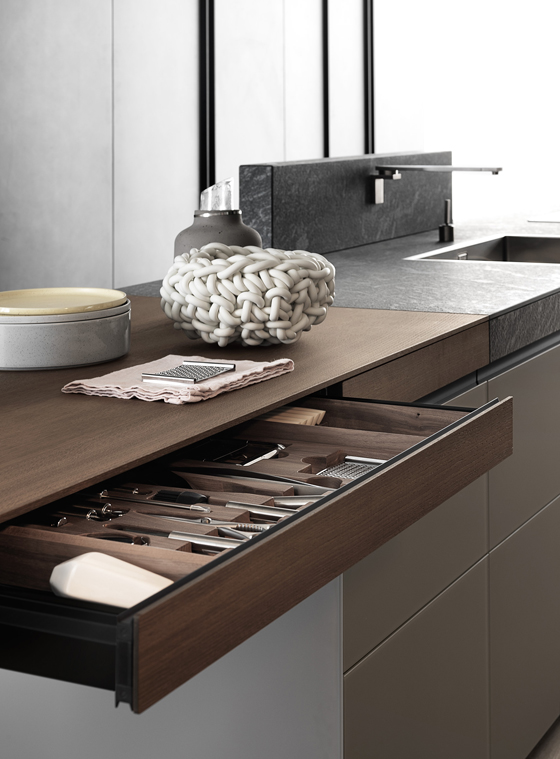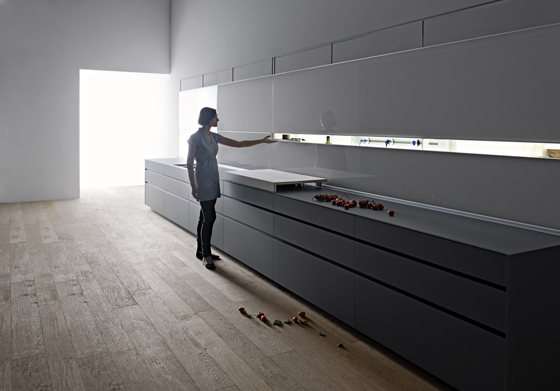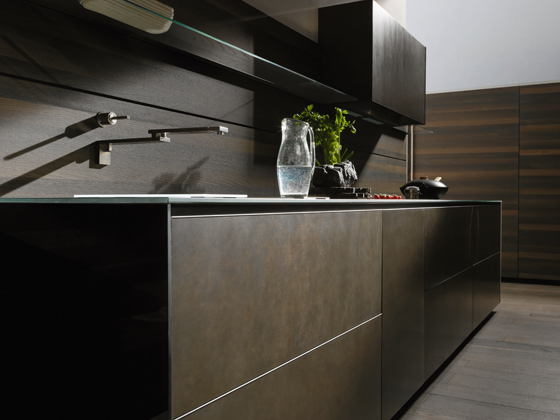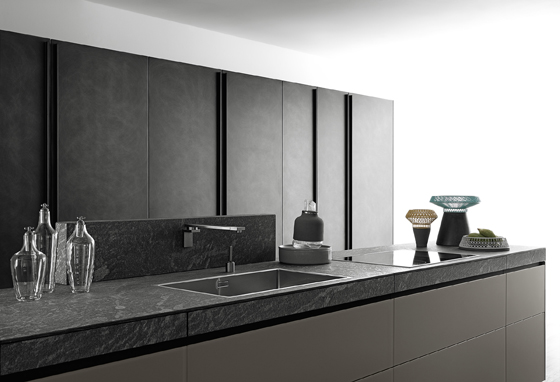The Taste of Technology
Historia de la marca de Giovanna Dunmall
Pordenone, Italia
31.05.16
Premium Italian kitchen brand VALCUCINE has been a market leader for years, innovating in kitchen design that marries discreet technology with quality surfaces and considered materials.
The concept behind Genius Loci kitchen is that of a secretaire-style desk with secret compartments. Here it is seen with the Air Logica illuminated back panel storage system and responsive doors that can be opened with a simple swipe of the hand
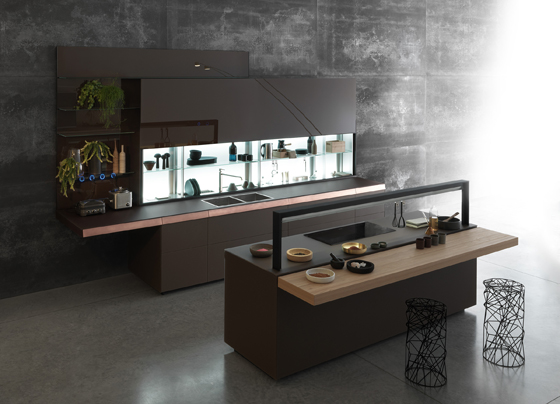
The concept behind Genius Loci kitchen is that of a secretaire-style desk with secret compartments. Here it is seen with the Air Logica illuminated back panel storage system and responsive doors that can be opened with a simple swipe of the hand
×Some 35 years after its inception in the Friuli Venezia Giulia region of northern Italy, internationally renowned kitchen brand Valcucine still leads the global pack in terms of design, detailing and tech-savvy.
It hasn’t done this by responding to trends or fashions however, but by focusing on long-term key values such as well-being, timelessness and innovation. Well-being in the sense of ergonomics, tactility and ease-of-use (Valcucine pioneered the fully equipped back panel in the 1990s, a place for storage, illumination and power sockets); timelessness because its main ethos has long been sustainability, recyclability and durability (and timelessness means you are less likely to want to throw out your kitchen when you get bored); and innovation because, well, the brand was the first company to make a kitchen – Artematica with Invitrum base units – where all the units and doors are 100% recyclable, as well as the first to produce a system – Riciclantica – where the unit doors and panels measure just 2mm, still the world’s lightest and thinnest.
The Genius Loci with a granite counter and worktop in burnished oak featuring an integrated drawer (top); the Genius Loci with copper finish drawers (above)
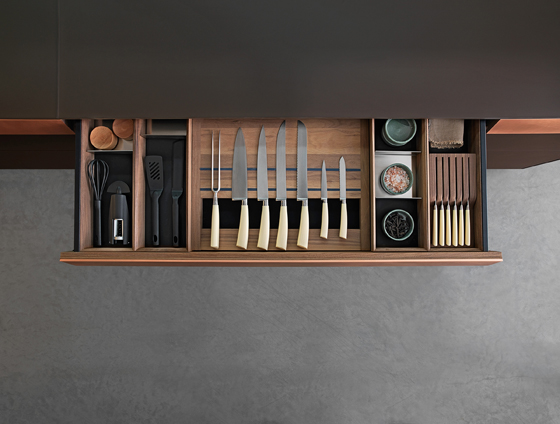
The Genius Loci with a granite counter and worktop in burnished oak featuring an integrated drawer (top); the Genius Loci with copper finish drawers (above)
×Last year, the brand (which does all its manufacturing in the west of the Friuli Venezia Giulia region) was purchased by ItalianCreationGroup, an industrial holding company that had bought furniture brand Driade back in 2014. The purchase has brought with it changes big and small. The latter include a refreshed logo for instance and the addition of the ‘Innovation for Life’ tag to all their products; the bigger involve a plan to update the image of their mono-brand sales outlets and showrooms, explains ItalianCreationGroup’s CEO Stefano Core.
And even bigger plans for expansion. “We are aiming to further our reach and presence internationally with about 30 new openings planned between now and the end of the year,” he says. Recent openings include showrooms in Singapore, Taiwan and New Delhi, next in line are Hong Kong, Paris and Bangkok.
The Artematica system with counters and doors in strengthened glass and the New Logica back panel that can be used for storage and kitchen accessories. Glass is one of the healthiest and most sustainable materials as it is 100% emissions-free
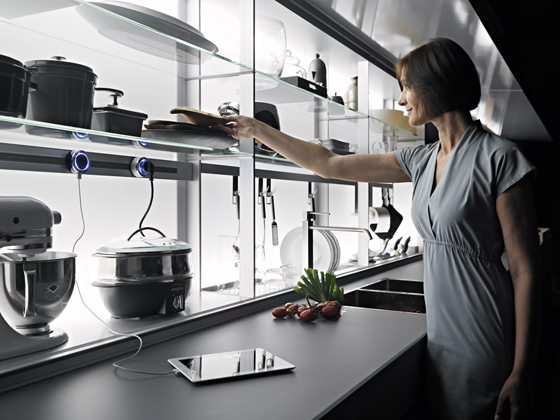
The Artematica system with counters and doors in strengthened glass and the New Logica back panel that can be used for storage and kitchen accessories. Glass is one of the healthiest and most sustainable materials as it is 100% emissions-free
×Core is keen to point out that the two companies will benefit from being “part of a system” but “that the identity of the brands and their continuity will be safeguarded”. One of the most significant people in terms of the brand’s continuity is undoubtedly long-term designer and one of the brand’s original co-founders Gabriele Centazzo. When designing a new kitchen, or a new feature for an existing kitchen system, “the choice is not dictated by current trends,” he says, but “by the search for a timeless design that is inherent in Valcucine’s DNA.”
The palette of neutral and earthy colours are derived from the four elements that make up the Valcucine logo – water, earth, air and fire – he explains, while natural materials such as stone, wood, glass are favoured over synthetic or man-made composites. Above all, the brand believes in a core philosophy of customisation and personalisation he says, exemplified by the master mosaic artisan that was busy customising the drawers of the Genius Loci kitchen in the brand’s Milan showroom during the recent Salone del Mobile. “The kitchen should be as unique is its owner,” says Centazzo, “and adapted to his or her tastes.”
The Riciclantica Inox Touch kitchen features the warmth of wood combined with stainless steel that has been sand-blasted (top); the Genius Loci with the clever Air Logica back panel storage system that makes the best use of extra-deep base units (above)
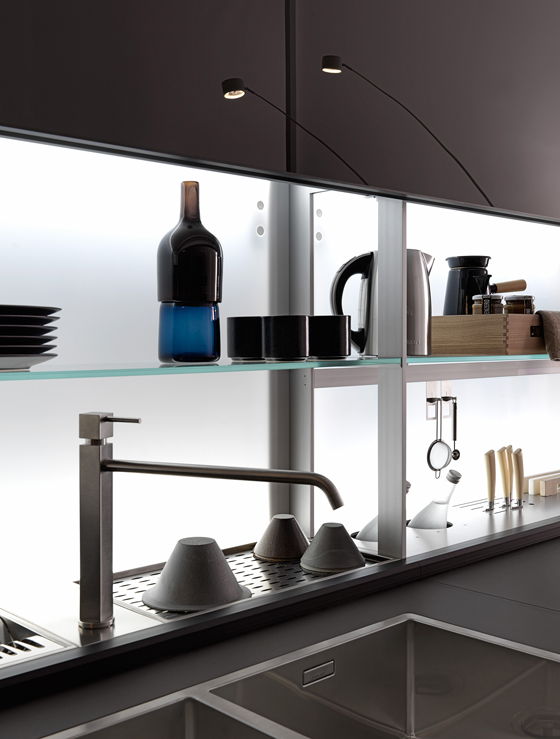
The Riciclantica Inox Touch kitchen features the warmth of wood combined with stainless steel that has been sand-blasted (top); the Genius Loci with the clever Air Logica back panel storage system that makes the best use of extra-deep base units (above)
×Part of the brand rethink its acquisition has entailed has included defining the four different typical Valcucine consumers: that is, the gourmet, the traditionalist, the health aficionado and the innovator. And this year’s launches cater to all of these.
The first is a new interactive kitchen system, V-Motion kit, which will become available for the Genius Loci system before the end of 2016. A smart opening and closing system for drawers and doors, it is activated by the merest wave of a hand and allows users to carry out tasks normally impossible to them while their hands are full or greasy from cooking. In much the same way, Valcucine’s patented Air Logica back panel storage system also opens and lights up (and even changes hue) with the simple movement of a hand, while drawers spring open when one’s foot is passed along the baseboard. It’s all very tech-forward and pleasingly unobtrusive.
The Genius Loci is now available with a counter made out of Cardoso stone from the Apuan Alps that is finished using a traditional process enhancing its texture. Here it is seen with a contrasting and integrated wooden table
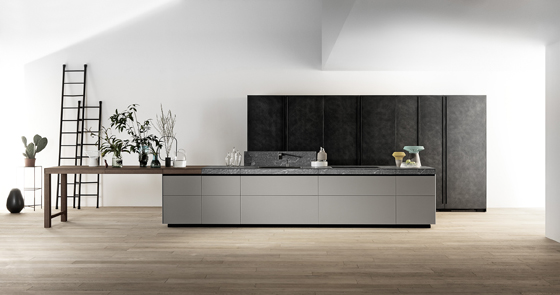
The Genius Loci is now available with a counter made out of Cardoso stone from the Apuan Alps that is finished using a traditional process enhancing its texture. Here it is seen with a contrasting and integrated wooden table
×Also presented at this year’s Eurocucina show in Milan was the new Gourmet system concept, which will be available as of 2017 for any existing Valcucine kitchen system. Designed for budding or aspiring chefs, it is a sliding steel-topped counter within a concealed storage area that can be used for prepping tasks and a ceramic-glass induction hob that is built flush with the counter tops. Once you have finished cooking, the whole element can be closed up and becomes an elegant piece of domestic furniture.
Lastly, a series of surface finishes that major in aesthetic beauty, depth of tone and superior sensorial qualities were also launched in Milan. These include a tactile Friulian elm (reminiscent of local mountain hut roofs, says Core), satin-finish aluminium and structured lacquers. New graphic and textile finishes are also now available for Valcucine’s iconic and specialty material, glass; the fabric lending a typically cold material a warmth and ‘softness’ it doesn’t usually possess. “Great attention was paid to sensory materials that could offer a stronger visual impact and a tactility that is both protective and reassuring,” explains Centazzo, making it clear that timelessness and well-being are also about appealing to people’s primal needs and emotions.
The reflective Valcucine HQ and factory (behind it) are located in the industrial quarter of Vallenoncello in Pordenone, north-eastern Italy
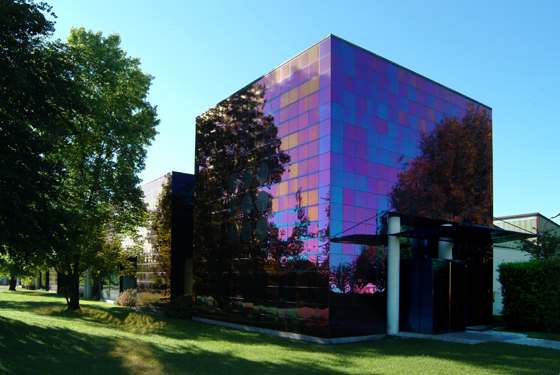
The reflective Valcucine HQ and factory (behind it) are located in the industrial quarter of Vallenoncello in Pordenone, north-eastern Italy
×By using materials such as glass and aluminium to create base units, Valcucine has become a world expert at using less to do more. Not only does this mean less wasted resources but materials such as glass (and aluminium) are also fully recyclable, highly resistant to wear, water, steam and heat and don’t create toxic emissions as they don’t require any glues. Centazzo says Valcucine has always believed that the well-being of its kitchen users is inextricably linked with a deep respect for the planet. “The two aspects are closely related; it’s for this reason that the most important projects we create are always the most ethical and fair ones.” And it’s perhaps this genuine eco-philosophy that most defines Valcucine among its peers and makes it – in an age of environmental degradation – immensely appealing. The firm stands for responsible design that is at once inventive, sophisticated and beautiful.
© Architonic


